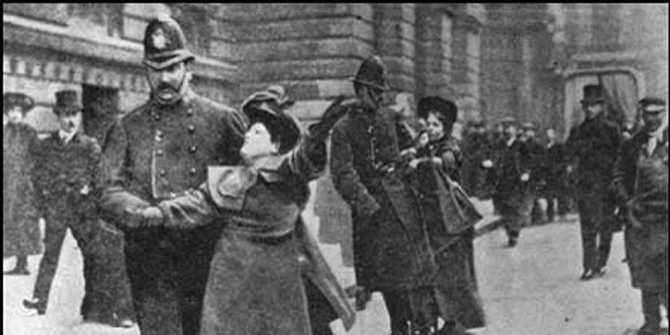To mark International Women’s Day 2022 we invited students to submit an article addressing this year’s theme #BreakTheBias. We’re delighted to announce Selin Gücüm as our third place winner.
It’s 8th of March, we cherish gender equality, and especially in Western democracies we state our belief that women are as capable as men. Indeed, much progress has been made in past decades to close the equality gap between men and women. Yet, according to the report on Gender Social Norms Index released by the United Nation Development Programme (UNDP) in 2020, despite all this progress, 90% of men and women hold bias against women. The index also indicates that half of the world’s men and women feel that men make better political leaders, more than 40% feel that men make better business executives and that men have more right to a job when jobs are scarce. Moreover, 28 % of men and women think it is vindicated for a man to beat his wife. Knowing that 96 out of 167 countries with populations of at least 500,000 were considered democracies of some kind in 2017, this finding should worry us.
Among many shocking aspects on this index, it is particularly important to underline that globally, not only men but women also still hold prejudice and bias toward women. When one thinks of gender bias towards women, this is a fact that is most often disregarded. Without undermining the fact that men’s prejudice is an obstacle to overcome gender bias, it is even more crucial to overcome women’s bias toward gender roles.
In fact, we all know the key role that suffragettes played to improve women’s rights, not only in Britain but around the world. On the other hand, we know less about the extensive history of women fighting to keep women imprisoned in traditional gender roles since the nineteenth century. As an example, in 1905 the Women’s Anti-Suffrage Association of the Third Judicial District of the State of New York published a book entitled “Arguments against women suffrage”. We all know about Ruth Bader Ginsburg’s admirable judicial struggles to improve gender equality. But the organised group of conservative women who fought and managed to defeat the Equal Rights Amendment in the U.S. in the 1970’s and 1980’s, despite the surveys indicating that many citizens approved the amendment, is much less famous.
All this to point out that, contrary to men, women still hold bias on their own gender, and this is the main hurdle to the demands and substantial improvements on women’s socio-economic situation.
One may think that this mostly concerns patriarchal and traditional societies rather than developed countries in which women are fully aware of their rights, but we need to look at the submerged part of the iceberg to see the complexity of the issue. To break the bias, women need to break the internalised inhibits established for centuries. Research in the U.S. across women, men, boys and girls indicates that we hold an implicit stereotype (“automatic associations that people cannot, or at least do not, report holding when asked directly”) associating genius, brilliance and aptitude as male traits. Thus, we are discouraging and do not welcome women to pursue fields associated with brilliance and aptitude. What is more worrying is that the research shows that people explicitly express that they associate women with brilliance while implicit measures uncover the automatic gender stereotypes that come to mind about brilliance. Moreover, the gender gap and male domination in high positions are partially due to the stereotypes that women hold on themselves killing their self-confidence. Research by Harvard Business School indicates that women retreat from certain professions stereotypically perceived as reserved for men such as science, math, and technology because they lack confidence in their abilities. This prevents them from choosing prestigious roles with higher incomes, sets them back professionally or academically, and even makes them think they do not belong to those fields, despite their skills to succeed. Furthermore, women seem to prevent themselves from expressing their ideas and responses despite having the same ability as men to answer questions. In fact, research indicates that women are more likely to disregard the praise and underestimate their own skills and aptitudes. Undoubtfully, many women advocating and believing in gender equality, when reading these studies would find an example from their lives or others. The punchline “How could men be so average yet so confident?” of a Chinese comedian Yang Li, in 2020 was enough to mobilise millions on the Chinese social media platform Weibo. It is important to be conscious of this “confidence gap” that reinforces stereotypes and gender bias. Marguerite Yourcenar, the first women to become a member of the Académie Française and who was raised and educated quite orthodoxically by her idiosyncratic father, had a very different approach on her condition as a woman. She announced in her autobiography How Many Years: A Memoir perhaps provocatively, at least at first glance, that “she would not be entrammelled by her condition of being a woman, as many women are still in our days, maybe because the idea to be entrammelled has never occurred to her”. Precisely, women should emancipate themselves from their own minds and prevent bias because it is the first obstacle to their success in a world that is already difficult for them. One of many thoughts in Virginia Woolf’s A Room of One’s Own, is that women’s partaking in art and literature depends on changing deep-rooted ideas about their own capabilities and goals. This is also the case beyond the fields of art and literature.
Women should dare to believe in themselves, in their talents, in their abilities and should break the chains of fear to establish other women’s confidence in their gender. This would be the most crucial step to break the bias. Identifying those talented women, reminding them of their aptitudes, continuously encouraging them with positive feedback in light of successful examples might help us to overcome the gender bias overtime. We need to encourage our girls from a young age and tell them that they are as capable and as talented as boys in every field, so that women can pursue the path where their passions and aptitudes lie.
Note: this article gives the views of the authors, and not the position of the LSE Department of Government, nor of the London School of Economics.
Image credit: main image contains elements of ‘I Believe I Can Fly’ by byronv2 and ‘Sky’ by Nanashino Gombie





